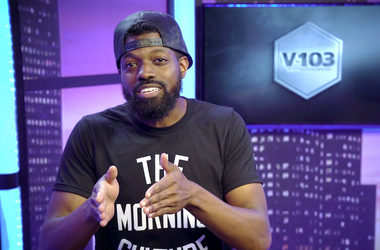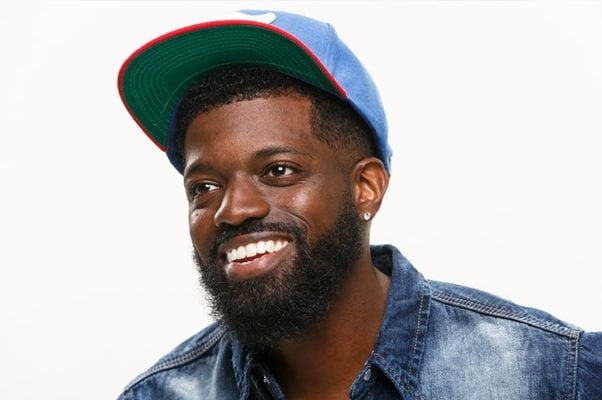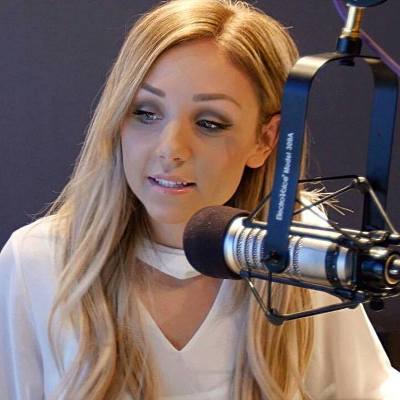Creating great content as a sports radio host is challenging enough right now without the support of live sports. Professional sports leagues are suspended indefinitely and broadcast companies are making budget cuts, but amid the chaos, a new nightly show debuted on CBS Sports Radio.
JRSportBrief, with host J.R. Jackson launched Monday, Mar. 23, taking over the 10pm – 2am timeslot previously held by Ferrall On The Bench. There’s a reason not many national radio shows launch during the MLB All-Star break. But having no sports isn’t a concern for J.R. who’s used to creating his own content.

Not a prototypical background for a sports radio host, he built his own brand and succeeded in the digital space at a young age. For J.R., building a sports show without sports to watch isn’t hard. Building a radio show without being able to walk down the street and talk to people during the COVID-19 pandemic is the more challenging part. J.R. is a host that values his listeners and wants to get to know them on a personal level to further the sense of community.
He joins CBS Sports Radio having already been a daily contributor to Entercom with V103 in Atlanta as a morning show host. Even though he’s on nationally until 2am every night, J.R. can still be heard regularly on V103, contributing to The Morning Culture and hosting with The Big Tigger Show in the afternoon
Brandon Contes: You have a unique story, because you built your own brand and did it rather quickly, you didn’t go to a broadcasting school like Syracuse for four years first. What made you want to start creating content?
J.R. Jackson: Entertainment has always been part of my life. My uncle was a radio DJ named Fatman Scoop and I grew up in New York watching him at Hot97. From there, I met my current manager and business partner Charlie Stettler.
I was encouraged to start my own video sports blog by Fred Seibert who ran a company called Next New Networks. It was one of the first internet video production companies and he sold it to Google. He had a lot of different shows – auto, cooking, but he didn’t have sports. He knew I was producing content for other people and said, ‘I know you love sports, if you can start your own sports blog, I would love to distribute it.’ I went home and started JRSportBrief. I kept cranking out content, got a couple million views in the first few years and then I signed a distribution agreement with Fred and continued growing the platform organically. Reaching out to people, building media and athlete relationships. It was literally shaking the hands of sports fans online and on YouTube and going out and doing the same in the community.
BC: Radio has a very hard time figuring out how to track and monetize digital platforms, but you turned it into a full-time job rather quickly, you made it into a business. How do you view the connection between radio and digital?
JR: At the end of the day, content is content, it’s just a matter of how you go about finding it. Every strong brand, every strong personality and radio station, it doesn’t matter if it’s an Instagram page or radio station, it’s built off the content you produce.
We now produce video content at our radio stations that gets distributed digitally. The same content we do on our shows, it goes right out to social media platforms, so it doesn’t matter if you’re in your car, at work, on the subway, you can open up your phone and have it. Digital and radio is very symbiotic.
BC: Is it difficult hosting and launching a sports show when there are no live sports right now?
JR: Not at all, life is difficult. The people who have to go out and do grunt work and deal with the climate we’re in, that’s difficult work. Me talking for four hours isn’t work. People are looking for familiar voices, they’re looking for diversions and they’re looking for a sense of community.

My first night with the new show on CBS Sports Radio I wanted to bring on Daymond John from Shark Tank, because he’s not shooting hoops or hitting baseballs, but he can speak about elements that are relevant to everybody, not just athletes or sports fans. There are a lot of stories that are relatable to fans, and radio stations have an opportunity to keep people on schedule, to be familiar and build a sense of community. At the end of the day, sports is a microcosm of life and there are a lot of stories to tell that deal with humanity. I don’t think sports radio is just reciting stats or arguing a point. There’s a big human element to it, so it’s not difficult at all.
BC: You mentioned the importance of building a community and talking to a lot of people, do you like taking calls? Because especially with national shows, there are differing opinions about whether or not they can enhance a show, some hosts do it, but plenty don’t like caller interaction because they feel it can derail a show.
JR: There’s no such thing. The people who listen to you are not derailing anything. It’s community based and I made it clear on my show that the people who listen, this is their show. I go back to when I started on JRSportBrief, the tagline I use is, “by a fan, for the fan.”
I’m not your prototypical sports fan given my relationships and position, but it’s about community. We’re not supposed to be out here shaking hands, we’re supposed to stay six feet apart from each other. But there is no show if the fans don’t listen and you can’t communicate with your people. I more than like taking calls, this is a show for the people. It’s their show. They will have a voice, they do have a voice and that’s me at my core. I want to go out and meet the people who I’m listening to.
BC: How do you sort through so many different topics and different options? Especially with national radio, there’s already so much you can dive into whereas locally, if you’re in New York on WFAN today, you know you’re talking about Robby Anderson and Noah Syndergaard’s elbow. But without sports, you really have a blank canvas daily, can that be daunting at all?
JR: It’s beautiful to have a blank canvas because you can put something together without barriers. How many of us, every single day can wake up and say I have a blank canvas to go out and do something awesome?
For me, it boils down to having your finger on the pulse of what’s going on. Whether it’s local or national, it doesn’t make a difference because I know what’s going on. I can’t do it in this climate with the coronavirus, but I get outside, I love walking around New York, I love walking around Atlanta, I love talking to the security guard, the receptionist, people at restaurants. I love talking and meeting listeners at remotes. Talking to fans, being at the stadium and getting to know managers, agents and players. When you know what’s going on, it’s not hard to tailor that message to the audience.

BC: Launching a sports radio show without sports, it might not be the optimal time to build a new show, but as you said, building a successful radio show is so much about creating a community of listeners. Is there anything to the idea that having this freedom to talk about anything you want can help listeners get to know you quicker on a personal level?
JR: Absolutely. My background, as you said, is not traditional. I didn’t go to Syracuse. I didn’t go to a broadcasting school, I learned all elements of this from the ground up. Pure experience. I put myself out there and built the platform.
For me, it’s all about community and I think I have a well-rounded experience from both production and being able to relate to different people. I’m not afraid to be on the lower end of the building hanging out with the security guards, and I’m also not afraid to hack it up with the president or multi-billionaire. People are people. Some people can only talk about sports, can only recite and regurgitate numbers. I’m a person, I’m a human being, I have varying interests.
BC: You have the perfect personality for launching a sports show without sports because you clearly have confidence in your entertainment value and the ability to know you can go off the cuff and talk about whatever topic rolls your way.
JR: This goes beyond sports for me, but it’s a matter of always being ready and always being prepared. I grew up in a military family and there’s not going to be a stone left unturned. There’s not going to be an alternative when you boil things down. You do it, or you don’t, there’s no middle.
There’s nothing I would do that I’m not going to be prepared for. This is not the greatest time in the history of our world. It’s not the greatest time with people passing away and getting sick. But this is also a time to realize our humanity and connect with one another. I’m not Mother Teresa healing the world and praying for it in totality, but I’m just trying to do my part with something I enjoy. Entertain folks and give them a platform, that’s extremely important to me.
BC: It’s too bad you didn’t start your show a week earlier because I kept hearing ‘the only live sporting event right now is the Iditarod’ and I bet not many sports radio hosts have the experience you do of going to Alaska and riding on a dog sled!
Jr: [Laughs] Alaska is beautiful and that’s something I have – that my background is really varied. I’ve been all over the world – India, Alaska, Brazil. It put me in a beautiful spot. I can sit here and say I’ve had conversations with everyone from President Clinton to Young Jeezy.
I have a unique background in entertainment, but mainly in the people business. When I think about my brand of sports and how I want to approach people, it’s no different than me sitting with you at the bar, or in a friend’s basement having a beer and watching the game. That’s how I want it to come across with listeners. I’m an ordinary guy just like everybody else. I like to throw out my trash, I like to figure out what meal I want to cook. It’s a real community and right now, what we’re doing on radio is allowing people to try and be normal.
BC: You’ve had these great experiences through your JRSportBrief platform, is there one that stands out the most?
JR: Nobody ever believes this answer, but I speak to a lot of classrooms and have for years. It’s always cool on career day when there’s an accountant, a guidance counselor, a lawyer – and then I talk about sports. Connecting with people is the standout moment.
It’s not meeting President Clinton, hanging out with Usain Bolt or talking to the late great Kobe. All of those are great moments, but at a point in time they become washed. They’re all people, all human beings to me, but that deep connection is what I value. At the end of the day, the material goods, the money, it doesn’t matter if I’m in a mansion or an apartment. I believe in people and I believe in experience. That’s the best moment, every time I can connect with somebody, because I wouldn’t be here if it wasn’t for that.
BC: Who were your biggest media influences growing up?
JR: I watched and paid close attention to everybody. Oprah, Stern, Wendy Williams – the way her show is produced is awesome. Growing up in New York, being able to listen to Mike and the Mad Dog and see how they format. It’s about taking different pieces of how people communicate, how they deliver their message and figure out how you can put it together yourself.
BC: You’ve talked a lot about building a community and involving the listeners, but what about utilizing people who work on the show? Is your show a collaboration?
JR: Absolutely! Anybody who thinks they know everything and can do everything isn’t that smart. I like collaboration and for someone who talks for a living, I like to listen, I like to learn, I like to absorb. I would be dumb as hell if I didn’t take advice. Surprisingly, I do even more listening than I do speaking. So, to have producers and folks who can give me advice and chime in as well, I want that.
BC: What about from a management standpoint? Who’s helped you the most?
JR: My uncle, Fatman Scoop was my first influence in radio. My current partner and manager Charlie Stettler managed Ed Lover and Dr. Dre and helped get them one of the largest deals early on in hip hop on radio. I’ve had plenty of influences that have helped along the way. Ironically, for someone who started off on YouTube, it’s all a matter of how you push the information out. Whether it’s radio, YouTube, TV, they’re all just different mediums. It’s like going to the buffet and saying what type of pizza do you want? A slice? Sicilian? It’s all pizza at the end of the day, just a matter of how you want to eat it.
BC: You’ve built your own brand, you’ve built a network, you’re a local radio host, a national radio host, what’s the next goal?
JR: It’s connecting with people and wherever that goes is fine by me. That’s always been my goal. Grow and at the same time provide opportunities for other people. It’s pretty cool to see people who have asked me for advice, then come up and do what I’m doing, and I’d be thrilled if they did what I did and went even further.

At the end of the day, I think legacy is what you do for yourself that makes you happy. It’s also what can you do for other people. I’ve seen that over the years and I’m very happy. I will continue to connect with folks and lay out the red carpet for people to say, ‘wow, this is a dude who started on YouTube and look what he’s doing.’
I can’t wait to continue to use my own voice to connect with listeners and give them a diversion, but also to encourage other people to build their brand and their businesses. I’d feel like I’m in a silo if I just sat and spoke. I want to see other people win and that’s what I want to continue to facilitate.
Brandon Contes is a former reporter for BSM, now working for Awful Announcing. You can find him on Twitter @BrandonContes or reach him by email at Brandon.Contes@gmail.com.







